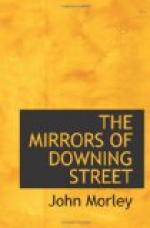There are other ways in which his lack of sensibility manifests itself in an unpleasant fashion. He is so self-absorbed that he appears to be wholly unaware of those who minister to his comfort. Of his servants he never knows the least detail, not even their names, and even a devoted secretary who has served him faithfully for many years may find himself treated almost as a stranger in a moment of need. I fear it must be said that in financial matters Mr. Balfour is as close-fisted as any miser, although I believe that this meanness has its rise, not so much in avariciousness as in a total incapacity to realize the importance of money to other people.
It has been said that the whole history of philosophical thought is an attempt to separate the object and the subject. Mr. Balfour appears to have made this separation complete. For him there is no object. His mind has embraced his subjective self, and has not merely refused the fruitless effort of attempting to stand outside its functions in order to perceive its own perceptions, but, abandoning the unperceived perceptions and the inactive activities of ultimate reality, it has canonized its own functions and deified its own subjective universe. So complete, indeed, is this separation that he can scarcely be called selfish, since for him there exists no objective field for the operation of unselfishness.
I lament this self-absorption of Mr. Balfour as much as I lament in his cousin Lord Robert Cecil the lack of the fighting qualities of leadership. To no man of the Unionist Party after the death of Lord Beaconsfield and Lord Salisbury have more hopeful opportunities presented themselves for creative statesmanship. He might have settled the Irish Question. He might have avoided the Boer War, in the conduct of which he behaved with real nobleness at the beginning. He might have saved Germany from her own war-mongers. In any case he might have led the Unionist Party towards construction and so have prevented the slap-dash methods at reform set going by Mr. Lloyd George after a long and irritating period of Tory pottering. For few men in modern times have exercised so great a fascination over that curious and easily satisfied body, the House of Commons, and no man in the public life of our times has enjoyed a more powerful prestige in the constituencies. Indeed, he stood for many years as the most dignified and honourable figure in the public life of Great Britain, and his influence in politics during the first part of that period was without serious rivalry.
It must not be forgotten, too, that in the days of “bloody Balfour” he was not merely chivalrous, but even Quixotic, in taking upon himself the mistakes and misdoings of his subordinates in Ireland. He certainly had the makings of a chivalrous figure, and perhaps even a great man. One thinks that he began his descent unconsciously, and that carelessness rather than any inherent badness led gradually to an egoism which has proved fatal to his powers and to his character.




